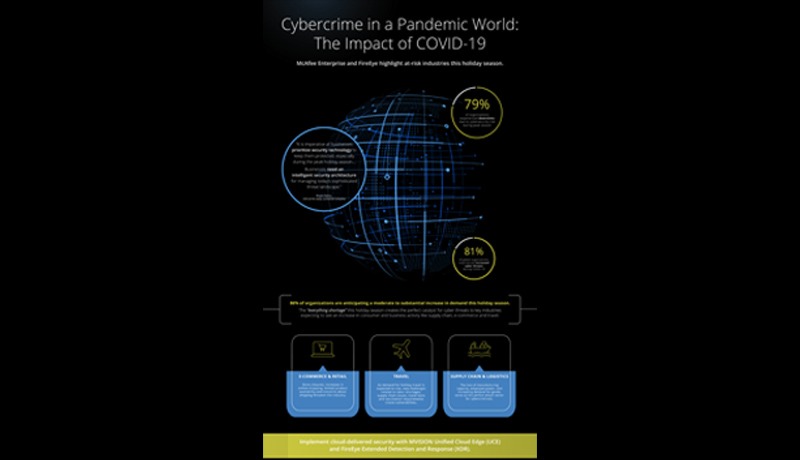
Cybercrime in a Pandemic World: The Impact of COVID-19 research was released by McAfee Enterprise and FireEye, demonstrating the urgent need for enterprises in the UAE and around the world to prioritize and reinforce their cybersecurity infrastructure.
According to the research, 87 percent of UAE firms saw elevated cyber threats during the pandemic, with 83 percent suffering downtime due to a cyber incident during a peak season. Supply chain and logistics, e-commerce and retail, and the travel industry all see expected surges in consumer and business activity as the holiday season approaches, making them more exposed to cyber threats and leaving UAE firms, employees, and consumers’ data unprotected.
“It is imperative all businesses prioritize security technology to keep them protected, especially during the peak holiday season,” said Bryan Palma, CEO of the newly combined company.
He added, “Most IT professionals want their organization to improve its overall cyber readiness. Businesses must do more and need an intelligent security architecture for managing today’s sophisticated threat landscape.”
The holiday season has a tremendous influence on sectors dealing with increasing consumer demands, in addition to increased consumer expenditure. 90 percent of businesses expect a moderate to the significant increase in demand during the holiday season of 2021. This year, the “everything scarcity” is genuine, from a labor shortfall to limited supplies to a lack of delivery services. This necessitates the development of practical security plans as well as effective containment and response to threats.
According to BCI’s Supply Chain Resilience Report 2021, 27.8 percent of firms had more than 20 supply chain interruptions in 2020, up from only 4.8 percent in 2019. The loss of production and logistics capacity and manpower, combined with rising demand for commodities, has created the ideal assault vector for cybercriminals: a potentially weak and vulnerable infrastructure. Risks must be identified, the potential downstream impacts of a security breach or cyberattack must be understood, and reaction plans must be prepared so that supply chain management can act promptly in the case of an incident.
According to Adobe’s 2021 Digital Economy Index, global internet spending over the holiday season is predicted to climb by 11% to $910 billion in 2021. This industry is facing more threats than ever before, thanks to store closures and a surge in internet buying, as well as limited product availability and shipping difficulties. The global retail business accounts for 5.2 percent of all detected cyberthreats, according to the McAfee Enterprise COVID-19 dashboard. Compromised payment credentials and cloud storage, as well as other types of retail fraud and theft, are examples of such concerns.
Airports, airlines, travel websites, and ride-sharing applications have all been targets of cyberattacks in the past. However, due to travel limitations, this industry has been in a holding pattern. Coronavirus-related losses are estimated to surpass $137.7 billion in 2020, according to the International Air Transport Association (IATA), with total industry losses expected to reach $201 billion in 2020-2022. As demand for holiday travel rises in the coming months, cyber criminals are capitalising on factors such as limited airline options due to labor shortages, supply chain challenges, new travel prohibitions, and vaccine requirements by exploiting vulnerabilities as much as possible.
While IT workers in the UAE are aware that cyber dangers have increased, the findings show that security has not been appropriately emphasized during COVID:
• 34% of companies have seen their technology and security spending cut.
• 57% feel the organization should put greater focus on a plan to prevent cyber-attacks.
• 84 percent say it’s significantly harder to keep a fully staffed security team/SOC during peak seasons.
Implementing security measures and industry-wide cybersecurity requirements, giving cybersecurity awareness training for staff, and building preventative and response strategies are all examples of ways for businesses to be proactive and actionable in the face of cybercrime. Enterprises and commercial businesses can also use MVISION Unified Cloud Edge (UCE) and FireEye Extended Detection and Response to create cloud-delivered security (XDR).